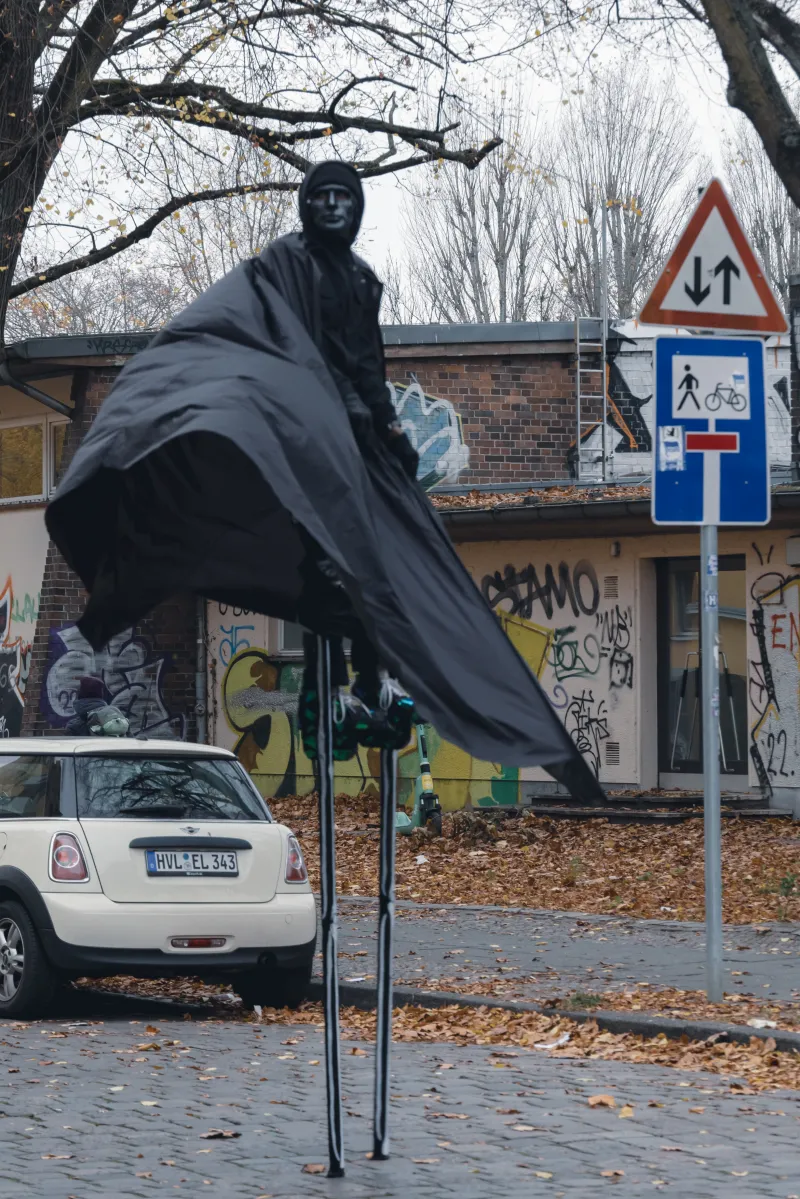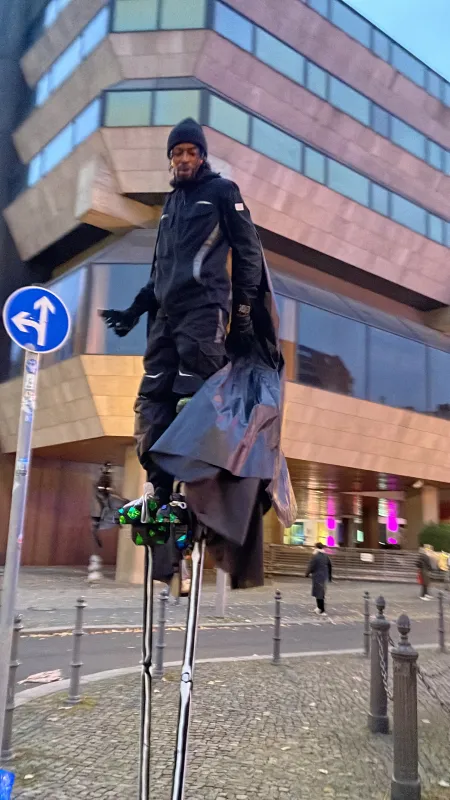MAS CAMP: Making Dreamers & Goners
Trinidad & Tobago‘s Carnival is a slippery timespace between power and resistance, masquerading in fabric and metal, sequins and mud. In the Mas you are losing yourself - and finding something truer in the echo. “A life-or-death thing,” as artist Felisha Carénage calls it.
In Mas Camps, costumes for Carnival are conceived, problem-solved and then produced by passionate and often socially precarious persons. These are no ordinary workshops - they are sites of imagination, survival, and skill. This is where someone teaches you how to sew yourself a bargain with history. This is silk screen and wire-bending and wood-bending and tie-dye in play with class mobility, safety and progress. Dreams are stitched, feathered, and wrestled into being, then sweated off, scattered and swept up by Ash Wednesday morning.
In November 2024, Carénage transformed the Barazani space into such a Mas Camp as part of the Dekoloniale Festival. And now, she returns to Spreeufer 6.
To share with you what the Moko Jumbies have since themselves invoked. Stilt-walkers are divine ghosts, guardians of the in-between. Under their protection, a city is open to mas, laid out to its people. In these islands, including Berlin, we are all dreamers and goners performing death and longing in a gorgeous dance.
Come see! Come listen.
To Be Man and Dragon
Up on the Hill Carnival Monday morning breaks upon the backs of these thin shacks with no cock’s crow, and before the mist clears, little boys, costumed in old dresses, their heads tied, holding brooms made from the ribs of coconut palm leaves, blowing whistles and beating kerosene tins for drums, move across the face of the awakening Hill, sweeping yards in a ritual, heralding the masqueraders’ coming, that goes back centuries for its beginnings, back across the Middle Passage, back to Mali and to Guinea and Dahomey and Congo, back to Africa when Maskers were sacred and revered, the keepers of the poisons and heads of secret societies, and such children went before them, clearing the ground, announcing their coming to the huts before which they would dance and make their terrible cries, affirming for the village, the tribe, warriorhood and femininity, linking the villagers to their ancestors, their Gods, remembered even now, so long after the Crossing, if not in the brain, certainly in the blood; so that every Carnival Monday morning, Aldrick Prospect, with only the memory burning in his blood, a memory that had endured the three hundred odd years to Calvary Hill felt, as he put on his dragon costume, a sense of entering a sacred mask that invested him with an ancestral authority to uphold before the people of this Hill, this tribe marooned so far from the homeland that never was their home, the warriorhood that had not died in them, their humanness that was determined not by their possession of things. He had a desire, a mission, to let them see their beauty, to uphold the unending rebellion they waged, huddled here on this stone and dirt hill hanging over the city like the open claws on a dragon’s hand, threatening destruction if they were not recognized as human beings.
But this Carnival, putting on his costume now at dawn, Aldrick had a feeling of being the last one, the last symbol of rebellion and threat to confront Port of Spain. Fisheye was under orders not to misbehave, Philo had given up on his own calypsos of rebellion to sing now about the Axe Man. Once upon a time the entire Carnival was expressions of rebellion. Once there were stickfighters who assembled each year to keep alive in battles between themselves the practice of a warriorhood born in them; and there were devils, black men who blackened themselves further with black grease to make of their very blackness a menace, a threat. They moved along the streets with horns on their heads and tridents in hand. They threatened to press their blackened selves against the well dressed spectators unless they were given money. And there were the jab jabs, men in jester costumes, their caps and shoes filled with tinkling bells, cracking long whips in the streets, with which they lashed each other with full force, proclaiming in this display that they could receive the hardest blow without flinching at its coming, without feeling what, at its landing, must have been burning pain. Suddenly they were all gone, outlawed from the city or just died, gone, and he felt alone. The dragon alone was left to carry the message. He felt that now, alone, with even Philo and Fisheye gone, it was too great to carry. It would be lost now among the clowns, among the fancy robbers and the fantasy presentations that were steadily entering Carnival; drowned amidst the satin and silks and the beads and feathers and rhinestones. But bothering him even more than this was the thought that maybe he didn’t believe in the dragon any more.
The moment Aldrick stepped outside, Carnival hit him. And his heart grew big, and he felt a softness flow over him, and the burning of tears in his nostrils; for there before him on the street, the steelband and masqueraders were assembling. The months of practising and sewing and painting and building were flowing together in the stillness of the morning under the eyes of women and children who had awakened from sleep and dressed hurriedly to come out and watch their band, to see their people, to admire them and to cheer them and to accompany them, to tramp the pavement, while the masqueraders occupied the street, as a sort of guard, right into Port of Spain. It hit him: masqueraders stepping out of these red dirt and stone yards, through the doors of leaning wooden shacks, middle-aged ladies fixing their brassiere straps, old man Johnson and his three grandchildren coming out as robbers, Prince, dressed up as a fancy Indian, showing off his headpiece, turning delicately, the breeze rocking him, so the people could see it, so they could say, ‘Hey, Prince! Man, you looking good. Man, you looking sweet. You go kill them.’ It hit him, the red and black and gold and green, the colours and the feathers and the satin, and the people’s faces with that look in their eyes, and the smell of cologne and face powder, and the smell of grease and the look of wonder on children’s faces, and the little fellars with sailor caps on and round-necked jerseys without no print, looking at the steelbandsmen lifting their pans onto the street, setting them down gently on the asphalt surface to a thrilling, scraping, metallic sound; and what reverence, what awe as if they alone in the whole world had the real eyes to see the real thing, to see heroes, to see giants, gods. And these little fellars waiting for the band to get underway so they could glide up to the steeldrums and touch one, or wave to a brother or cousin who was playing one of the pans, or help the men push the stands on which the big steel drums were mounted.
And watching, fascinated by it all, as if he were seeing with the boys’ eyes, Aldrick felt a tallness and a pride, felt his hair rise on his head, felt: ‘No, this ain’t no joke. This is warriors going to battle. This is the guts of the people, their blood; this is the self of the people that they screaming out they possess, that they scrimp and save and whore and work and thief to drag out of the hard rockstone and dirt to show the world they is people.’ He felt: ‘This is people taller than cathedrals; this is people more beautiful than avenues with trees.’ And full to brimming with furious tears, Aldrick felt again the fierce love and hope that he had doubted in himself, felt again a sense of mission; felt that yes, there was a place here for him, that there was something to say yes to, and people before whom and on whose behalf he could dance the dragon. With a strong, piercing scream, he stepped into the street, his chains rattling, his arms outflung, his head lolling, in a slow, threatening dance of the Beast, so that the people of the Hill turned to him, recognizing him, said, ‘Yes! Yes! That is Dragon!’
Afterwards Terry rang a piece of iron, calling the band to attention; then, One … two … three … four, Pram! The music burst forth from the steelband; shouts went up, and the steelband and the masqueraders and the women who had come to watch and the little boys waiting to venture to touch a pan and the help to push the stands and the robbers and the Indians and the clowns – the whole Hill began moving down upon Port of Spain.
For two full days Aldrick was a dragon in Port of Spain, moving through the loud, hot streets, dancing the bad-devil dance, dancing the stickman dance, dancing Sylvia and Inez and Basil and his grandfather and the Hill and the fellars by the Corner, leaning against the wall, waiting for the police to raid them. He was Manzanilla, Calvary Hill, Congo, Dahomey, Ghana. He was Africa, the ancestral Masker, affirming the power of the warrior, prancing and bowing, breathing out fire, lunging against his chains, threatening with his claws, saying to the city: ‘I is a dragon. I have fire in my belly and claws on my hands; watch me! Note me well, for I am ready to burn down your city. I am ready to tear you apart, limb by limb.’
And he watched terror strike pale faces as he lunged towards them, and he smiled inwardly as they grinned nervously and rushed hands into their pockets to find coins to offer him in appeasement, as was the tradition. But no. No. He refused the money. He wanted it to be known that he was for real, that you couldn’t just offer him a coin and he would disappear. He wanted them to know that he would always be threatening there, a breath away from them. Some couldn’t understand it, this refusal of the coins. They thought that they were not offering enough; and as he danced before them they made another journey into their pockets and showed him more coins. He didn’t take the money – ‘No, this couldn’t happen! This dragon was crazy! This fellar wanted trouble!’ But it was Carnival. Whoever heard someone calling the police for a Dragon. Aldrick growled and he spat and he moved to press against them, watched them grow more afraid, more confused. He wanted to frighten them. He liked it when they saw him coming and gathered up their children and ran.
Oh, he danced. He danced pretty. He danced to say, ‘You are beautiful, Calvary Hill and John John and Laventille and Shanty Town. Listen to your steelbands how they playing! Look at your children how they dancing! Look at your beads and feathers! Look at the colours of your costumes in the sunshine! Look at your colours! You is people, people. People is you, people!’ He wanted everybody to see him. When they saw him, they had to be blind not to see. They had to be deaf not to hear that people everywhere want to be people, and that they going to be that anyway, even if they have to rip open the guts of the city.
Earl Lovelace, The Dragon Can‘t Dance
A solo presentation at Barazani.berlin. by Felisha Carénage, curated by Isabel Raabe. Featuring costumes for a performance commissioned by Dekoloniale Berlin in 2024, as well as recent artworks. The exhibition is accompanied by Private & Public guided tours.
This project is supported by Senatsverwaltung für Kultur und Zusammenhalt, Berlin.
Further support has come from BPA// Berlin Program for Artists, 1000 Mokos and Alice Yard.





